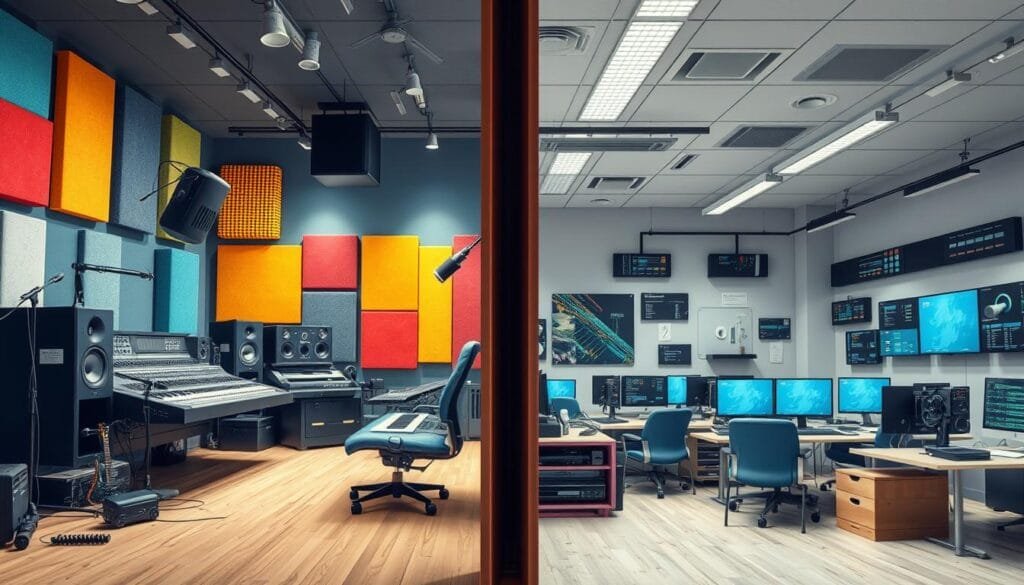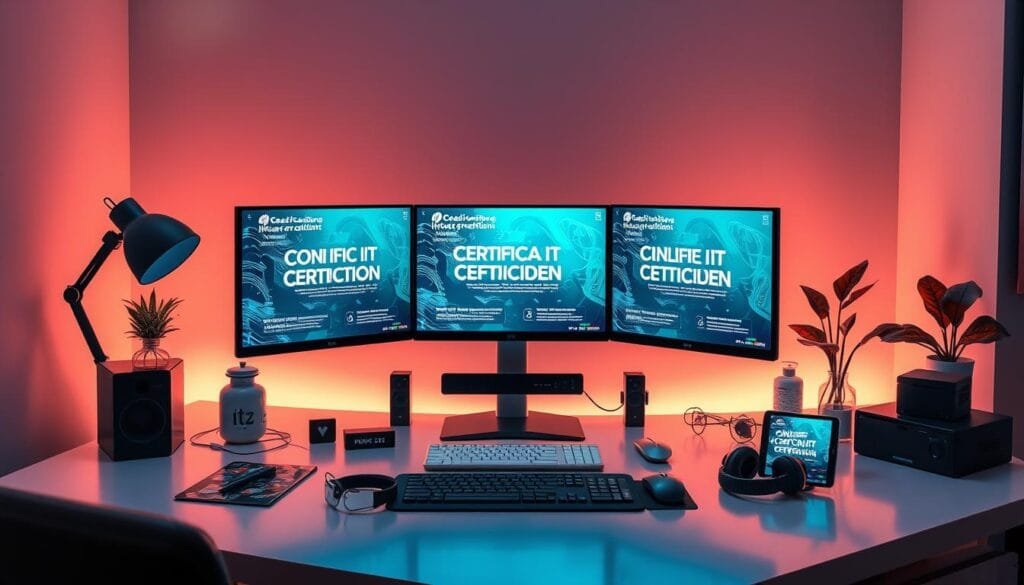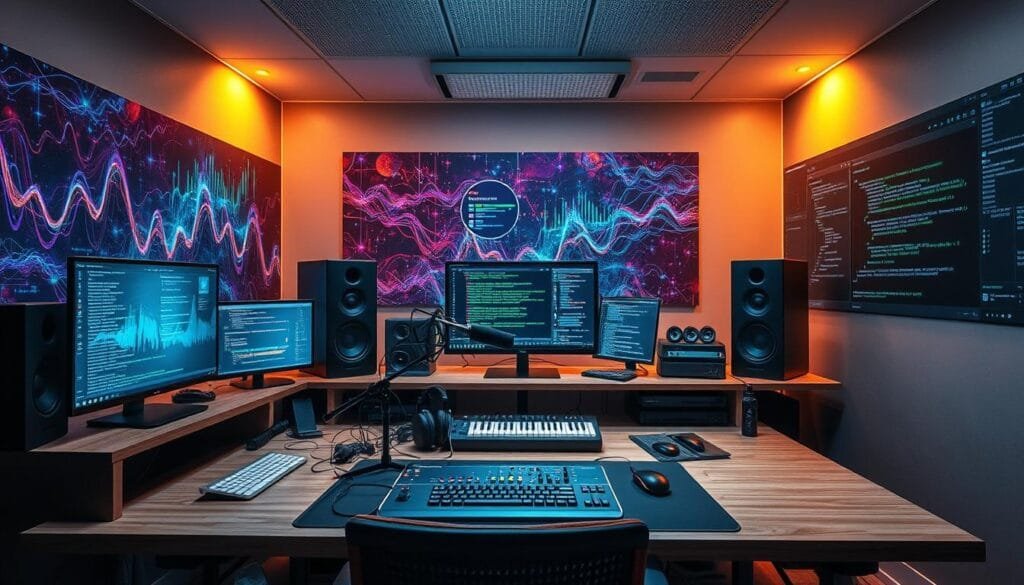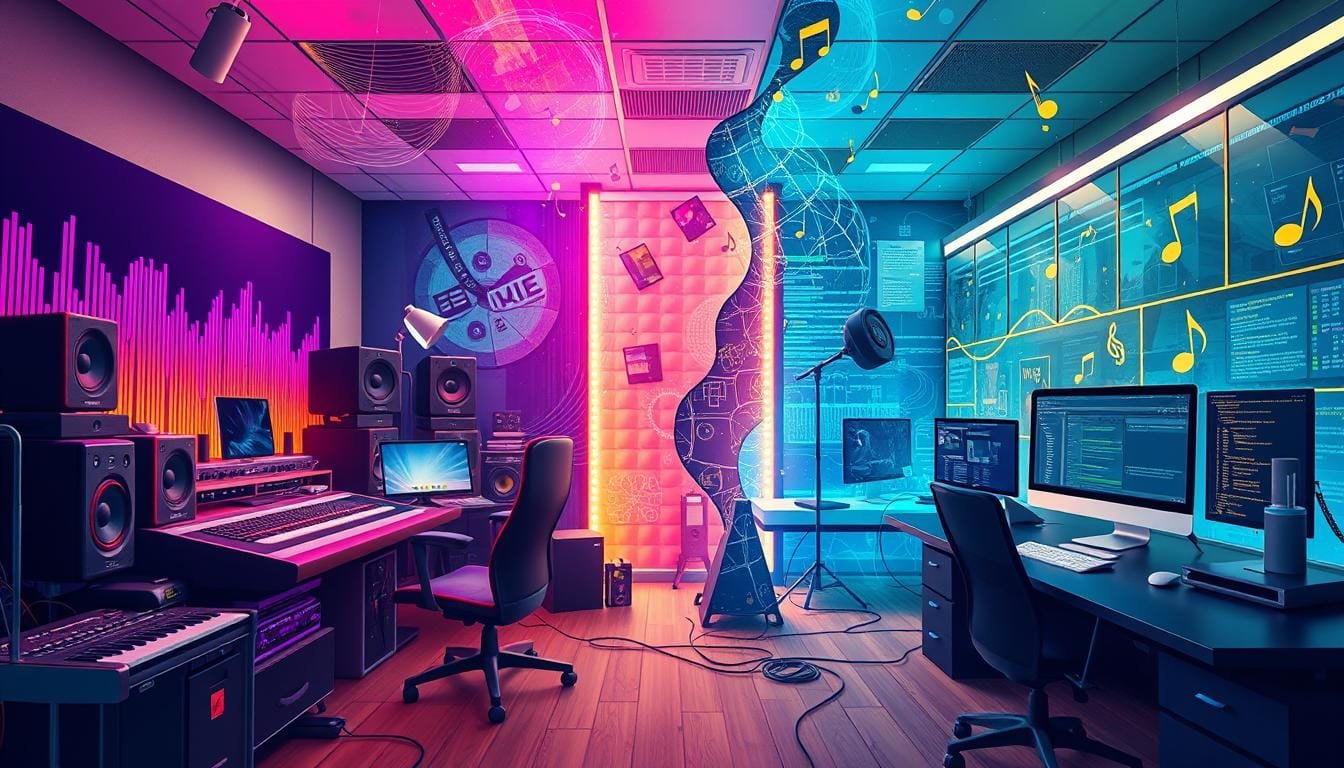The digital world is always growing. It changes how we live and what jobs we pick. If you’re good at audio production, you might not think about IT. But, the skills you’ve learned could help you move into the IT field. Schools like F.I.R.S.T. Institute teach digital and tech skills. These can help students switch their degrees to IT1.
Changing careers from audio production to IT is a big step. But, seeing how the two areas connect can help. Skills from audio production are useful in IT. These include analyzing sounds and using tech well. You can do many things with an audio production degree, like making music tracks better or managing live sound at events. These abilities are preparing you for the IT world1.
Key Takeaways
- A career in audio can lead to various opportunities, including working with live sound, broadcast engineer roles, game audio design, and many more1.
- IT roles often seek the kind of critical thinking and technical understanding that audio production experts possess.
- The rich, diverse curriculum of audio production can complement IT education, providing a wealth of transferable skills2.
- Degree conversion can be facilitated through identifying overlapping areas of expertise and seeking bridge programs.
- Technological adeptness, a staple in audio production, is vital for navigating a successful IT career path.
- Audio production career earnings fluctuate by location and experience, a trend similarly seen in the IT industry1.
- Educational institutions like F.I.R.S.T. Institute and Michigan Tech offer resources that can kickstart careers in both audio production and IT3.
Understanding the Leap: From Sound Boards to Keyboards
Shifting from audio production to information technology is a big career move. Yet, it opens up vast possibilities for those versed in audio but keen on IT. The need for IT specialists soars as companies depend more on technology. Thus, moving from sound boards to keyboards brings not just a change in tools but a whole new world of career chances.
Why Make the Switch?
Audio production is rewarding, but IT offers more. In IT, you can find better job security, higher pay, and chances to lead. For those good with technology and capable of adapting, switching to IT is wise. The job market now values tech skills more than ever.
The Growing Demand for IT Professionals
The IT industry is booming due to cloud computing, big data, and cybersecurity. Studies show these tech advances have spiked IT needs in various fields. This has made IT careers not just plentiful but essential as companies go digital45.
Skills in Audio Production That Transition to IT
Audio production skills are valuable in IT. Handling software, understanding digital interfaces, and critical thinking are key skills for making the switch. Additionally, being good at programming languages like C++ and Python helps audio engineers quickly fit into IT roles4.
The journey from audio production to IT involves using your skills wisely. It’s about matching your abilities with the growing IT demand. This way, you can thrive in a changing job landscape.
Curriculum Comparison: Audio Production vs. IT Education
Comparing curriculums in education is key, especially for career choices. When we look at Audio Production versus IT Education, it’s vital to explore their educational content deeply. We need to check what students learn in both and see what skills they can gain. Through this analysis, we understand the strengths and uses of each field better.
Core Subjects in Audio Production
Audio Production is all about learning how sound works, creating music, and mixing. The Audio Production Technologies degree includes courses that teach these skills. Students must do well in these subjects to move forward. They also learn about laws and rights in the music industry6.
Key IT Courses and Their Value
IT education focuses on using computers, managing networks, and analyzing systems. These courses help students tackle tough tech problems. They blend tech know-how with problem-solving and critical thinking. IT programs also mix in computer science, readying students for different tech careers.
Overlap in Skills and Knowledge
Though Audio Production and IT seem different, they share some skills, thanks to new tech. Take Carnegie Mellon University’s Music and Technology program, for example. It offers studies in both music and tech. This kind of learning brings together various skills, making students adaptable to both fields7.

Both education paths include skills that connect Audio Production and IT. This shows that merging the two can be good. Looking at the courses, we see a mix that makes students well-prepared for the job market. This mix of creativity from audio and strategic thinking from IT opens new career and innovation opportunities.
How to Convert Bachelors in Audio Production to Information Technology
Switching from a Bachelor’s in Audio Production to Information Technology means several steps. You need to build on your skills and learn new tech knowledge. This journey includes evaluating credits, finding bridge programs, and using online certifications to move into IT.
Evaluating Your Current Credits
The first step is checking the credits from your audio production degree. It’s key to see how these can apply to IT courses. For instance, some schools have agreements that digital tool management skills are useful in both areas8.
Finding Bridge Programs and Courses
Bridge programs help audio production graduates get into IT. They are made to fill in technical knowledge gaps. You’ll learn about software engineering, audio programming, and digital effects, which are key in gaming9.
Online Resources and Certifications
To boost your IT skills, getting online certifications is a good idea. Platforms like Coursera and Udacity provide CompTIA A+, CCNA, and Microsoft certifications. These are sought after by those moving into IT8. Certifications prove your skills and help you stand out job-wise.

Also, real-life experience through internships or projects is vital. It narrows the gap between what you know and what you can do. Highlighting these projects in your portfolio shows employers your practical skills8.
Last, always keep learning and connect with others in IT. Being up-to-date with IT advancements and networking opens job doors. It also offers insights into the IT world8.
Navigating Career Paths: Opportunities in IT
Moving from audio production to IT brings many job chances, especially in software development. People with audio production skills bring unique qualities to tech roles. These include a keen attention to detail and precision.
From Audio Engineering to Software Development
Audio engineers can switch to software development using their problem-solving abilities. One way is by taking programming classes, such as Introduction to Programming with Python10. Learning to code helps them enter IT fields focused on software creation and enhancement.
IT Roles Suited for Audio Production Graduates
The IT sector offers jobs beyond the usual roles, including ones where sound knowledge is key. For instance, as digital tech grows, there’s a bigger need for experts in audiovisual systems. Courses like INFO.2310 Graphics for Multimedia boost multimedia design skills for IT jobs10.
Emerging Fields: Sound Technology in IT
New tech areas also value audio skills. Sound design is essential in virtual and augmented reality to make experiences real. INFO.2300 Introduction to Multimedia teaches these important multimedia concepts10.
To learn more about IT careers from audio engineering, check out career development resources. They provide info on needed education, certifications, and job outlook in IT11.
Real Stories: Successful Transitions to the IT World
Switching from audio production to IT might seem odd. But, many creatives have successfully made the leap into the tech field. These stories aren’t just uplifting. They give us real tips on how to adjust to the always changing world of IT.

Case Study: The Programmer with a Producer’s Past
An example is someone who was a video editing expert for ten years before jumping into IT. Moving from video edits to coding sounds challenging. But, skills like detail focus and managing projects helped make it smooth. This person embraced IT by getting certifications and eagerly learning, showing us a prime example of shifting to an IT career12. Making industry connections also played a big role in their success, offering guidance while exploring this new field12.
Interview: From Mixing Tracks to Managing Networks
A talk with an ex-audio engineer turned network manager shares insight. It shows how sound engineering and IT management skills can overlap. They first talked about their change online, drawing a lot of attention with 92 points and many comments, indicating strong interest in such shifts13. The online community provided much-needed advice and support for people making similar moves, highlighting the importance of community in career changes13.
These tales highlight the need for flexibility and willingness to learn in today’s job market. They encourage those thinking about a big career change into IT. Whether using what you already know or learning new skills, IT offers many chances for those ready to change and grow their careers.
Essential Skills To Develop for Your New IT Career
Moving from audio production to a successful IT career requires focusing on technical and soft skills. This ensures growth and adaptability in a fast-changing field.
Technical Skills in High Demand
In the IT world, certain technical skills are essential. Courses at places like SAE Institute provide skills in studio production and music theory. However, IT focuses on coding, system analysis, and cybersecurity14. Being skilled in IT is not only about knowing programming languages. It also means solving complex problems and dealing with security risks14.
Soft Skills That Make a Difference
Along with technical skills, soft skills are crucial in IT, similar to audio production. Skills like communication, teamwork, and project management are vital. They help professionals share ideas, work well together, and manage projects successfully. This makes sure projects are completed on time and goals are met. Being able to adapt, a skill from the audio world, is very important in IT too. This is because IT is always changing14.
- Coding: Foundation of building and understanding software applications.
- System Analysis: Essential for evaluating system issues and implementing effective solutions.
- Cybersecurity: Crucial for protecting systems and data from cyber threats.
- Communication: Key to explaining complex technical things and working with others.
- Teamwork: Helps solve problems and bring new ideas together.
- Project Management: Important for managing projects from start to finish.
Statistics from both audio and IT show a clear skill overlap, ensuring that audio skills are very useful in IT1516.
Learning about these shared skills and improving them can greatly help your IT career. Making the switch from audio production to IT can be a smart choice for your future.
Conclusion
Changing your degree needs a smart plan. Skills that match what jobs need can make moving from Audio Production to IT good. The education from courses like the BA in Audio & Music Production17 helps understand IT. These programs get students ready by teaching them about audio and general knowledge, which helps in solving problems in both areas18.
To stay relevant in changing jobs, learning all your life is key. Moving ahead in your career is not just about classes or tech. It’s also about being ready to learn new things from different fields17. A background in Music Audio Engineering enables graduates to take on varied IT roles. This could range from studio work to making software18.
Today, as streaming and AI tech grow, audio and music blend with IT, opening new paths for jobs. Students skilled in using advanced production tools can easily work in IT areas. This shows those with deep knowledge in audio production and IT can find many chances thanks to this blend19.
FAQ
Why should I consider a career transition from audio production to information technology?
The world of tech is always growing, offering new and exciting job paths. If you’ve worked in audio production, your skills are very useful in IT. This includes understanding tech trends and being able to solve problems.
What is the growing demand for IT professionals?
Today, tech is a big part of our lives and work, making IT skills in high demand. There are many jobs, from managing networks to protecting data. This opens doors to various careers for those who are tech-savvy.
What skills from audio production are transferable to a career in IT?
People in audio production are great with tech, creative thinking, and managing projects. These skills are perfect for IT work. They are already good at using computers and solving problems, which is a big plus.
How do the curricula for audio production and IT education compare?
Studying audio production, you learn about sound and creating music. IT education, however, is more about computers and networks. Yet, both require a deep understanding of tech and using digital tools effectively.
What steps can I take to convert my bachelor’s in audio production to a career in information technology?
Start by looking at what you’ve already learned and how it fits with IT. You might need to take extra courses to learn more about IT. Gaining more certifications online can also help boost your tech skills.
What career opportunities might be suited for graduates from audio production programs entering the IT field?
Graduates might work with audiovisual systems, integrate different tech, or consult on audio equipment. There are also new areas like designing game sounds or creating virtual reality experiences. These fields are great for those with a passion for sound and tech.
Where can I find real-world examples of successful transitions from audio production to IT?
Looking at stories of people who’ve switched from audio to IT can be really inspiring. These stories show the benefits and how to use your skills in a new way. You can find them in case studies or industry interviews.
What technical and soft skills should I focus on for a successful IT career?
For IT, you should know coding, analyzing systems, and protecting against cyber threats. Skills in working together and managing projects are also key. These skills are often developed through audio production and are valuable in IT.
